- Home
- David Gemmell
Fall of Kings Page 12
Fall of Kings Read online
Page 12
She shrugged. “They are your visions. I do not know what you saw.”
“At the last I saw a mountain explode and destroy the sun.”
“Ah,” she said, “then I am wrong, for I do know that vision. It will not destroy the sun, merely block out its light. It is a true vision, Gershom.”
Gershom drank more water. “My head is still full of mist,” he said. “Upon the fire mountain there was a great temple in the shape of a horse.”
“Yes, it is the temple on Thera,” she answered.
Gershom leaned forward. “Then you must not go there. Nothing living could survive what I saw.”
“I know,” she said, pulling the crown of leaves from her head and shaking twigs from her long dark hair. “I will die on Thera. I have known this since I was old enough to know anything.”
He looked at her then, and his heart was full of grief. She looked so fragile and alone, her eyes haunted, her expression sad. Gershom reached out to draw her into a hug, but she moved back from him. “I am not frightened by death, Gershom. And all my fears will end on the Beautiful Isle.”
“It did not look beautiful to me,” he said.
“It has had many shapes and many names through the Ages of Man. It will have more yet, all of them beautiful.” She sighed. “But this night is not about my life and death. It is about you, Man of Stone. Your days upon the sea are almost done. You made a vow, and soon you will be required to honor it.”
As she spoke, Gershom’s thoughts flew back to the time Helikaon had been close to death. With the surgeons and healers of Troy powerless to save him Gershom had sought out a mysterious holy man, a desert dweller known as the Prophet. Even now he recalled with absolute clarity the first meeting and the words spoken there. The white-bearded Prophet had agreed to heal Helikaon, but for a price, and not one to be paid with gold or silver.
“I will one day call for you,” he told Gershom that night, “and you will come to me wherever I am. You will then do as I bid for one year.”
“I will become your slave?”
The Prophet’s answer was softly spoken, and Gershom remembered the subtle note of contempt in it. “Is the price too high, Prince Ahmose?”
Gershom wanted to refuse. Pride demanded it. He wanted to shout that yes, the price was too high. He was a prince of Egypte and no man’s slave. Yet he did not speak. He sat quietly, scarcely able to breathe through his tension. Helikaon was his friend and had saved his life. No matter the cost, he had to repay that debt.
“I agree,” he said at last.
Now, in the moonlight, he looked at Kassandra. “He will call for me soon?”
“Yes. You will not see Troy again, Gershom.”
CHAPTER EIGHT
THE CRIMSON DEMON
Kleitos the Mykene ambassador sat quietly nursing a cup of wine. The atmosphere in Alkaios’ megaron was subdued, the fifty or more guests eating and drinking in near silence. There was tension in the room, and Kleitos watched as people furtively glanced at Persion and Helikaon, who were sitting at opposite ends of the king’s table.
For Kleitos this night was an answer to a prayer, a gift from the gods to a man who obediently served them. His life had been singularly blessed. Above all he had been born into a land and a people loved by the gods. The Mykene were the greatest race of the Great Green, more noble, more heroic than any other. Agamemnon King epitomized that greatness. He had seen before all others the danger Troy represented to all the nations. He had recognized in Priam a despot determined to subdue all free peoples to his will. While others had been bribed or seduced by the wily Trojan king, Agamemnon had not been fooled. Because of his wisdom the vileness of Troy would be cut away, its walls torn down, its people enslaved.
This night, as a foreshadowing of that great day, one of the worst enemies of the Mykene, a man of true evil, was to be struck down by the righteous strength of a Mykene warrior. It would be a night of justice, a night for the gods to rejoice.
The heavily pregnant woman on his left leaned across him, trying to reach a platter of fruit. Her arm brushed his, spilling a little of his wine.
“My apologies, Lord Kleitos,” she said. Kleitos wanted to slap her. Instead he smiled, reached for the platter, and placed it before her.
“None are needed, Arianna Queen,” he told her, instantly turning his head away in the hope the fat sow would understand that he had no wish to converse with her. But the woman, like most of her kind, was uncomprehending and could not take a simple hint. She insisted on talking to him, continuing the conversation they had started earlier.
“But I do not understand, Ambassador,” she said. “You say Priam was planning to plunge the world into war.”
“Yes. To make himself master of the world.”
“Why?”
He stared at her. “Why? Because…he is evil and a tyrant.”
“I meant, what would he gain from sending armies to attack his neighbors? He is already the richest king. Armies are costly. Each area, once subdued, would need to be patrolled, and forts built. Endless armies roaming the lands would drain even Troy’s great wealth.”
“What would he gain?” he repeated, trying to give himself time to think. “He would be seen as a conqueror and a great warrior king. He would have fame and glory.”
“And this would be important to him?”
“Of course it would be important. All true men desire fame and glory.”
“Ah,” she said. “I am confused again now. Is he a true man, then, or an evil tyrant? Or somehow both?”
“He is evil, as I have said.”
“So the evil also desire fame and glory. How, then, do we tell them apart?”
“It is not always easy,” he replied, “especially for women. One must rely on the wisdom of great kings like Agamemnon.”
“I have heard of his greatness,” said the queen. “My husband talks of his conquests, of the numbers of cities he has overcome, the slaves and the plunder he has gathered. From Sparta in the south all the way north to Thraki. I am not good with numbers. Is it fourteen kings and princes he has slain or sixteen?”
“I have not kept count,” Kleitos told her. “It is true, though, that Agamemnon King is a warrior without peer.”
“A man of fame and glory,” she said.
“Indeed so.”
She leaned in then. “Ah, yes, I think I have a grasp of it now. Priam fooled us all, disguising his plans for domination with forty years of peace. Such cunning approaches genius, don’t you think?”
Arianna smiled sweetly, then turned away to speak to other guests. Kleitos stared malevolently at her. One day, he promised himself, she will pay for such disrespect. Just as her husband would suffer for his sly, mocking tone.
He glanced along the table at Helikaon. The villain seemed relaxed. He was smiling and chatting with some merchant. Kleitos noticed, though, that he hardly touched his wine cup. Alkaios was engaged in conversation with the wife of Hektor. Kleitos was impressed with her. She had not arrived at the feast, as had other women, bedecked in jewelry but wearing a simple green gown and a single pendant. Such behavior entirely befitted a woman traveling without her husband. Torchlight shone on her red-gold hair, and Kleitos found himself staring at the curve of her neck, his gaze flowing down to her breasts. Hektor was a lucky man to have found such a wife. Tall, graceful, demure in her dress and her manner, she was a beauty. Kleitos wondered if Agamemnon King would grant him Andromache as a prize when the city fell. Probably not, he decided ruefully. Her son would have to be executed, and women rarely forgave such necessities. No, he realized, she would have to be killed, too.
Toward the end of the feast a storyteller was called out, a young man with tightly curled blond hair and the face of a girl. Kleitos disliked him the instant he walked before the assembly. He was obviously the soft-bellied son of a rich man who never had to fight for what he wanted or struggle to stay alive in a harsh world.
His voice, though, had range, and his story was well told.
The tale itself was exceptional, but then, it had been devised by Odysseus, and Kleitos already had heard it from the master himself. Now, there was a man who could tell stories.
The girl-faced bard entertained the crowd with the exploits of the sea king and the sorceress and the battle with the dread one-eyed giant Cyclops. At the conclusion the bard opened his arms and bowed deeply to Alkaios. Applause thundered out, and the king tossed the man a pouch of copper rings.
In the silence that followed the performance Kleitos flicked a glance at Persion. The warrior nodded, then pushed himself to his feet.
“I have a grievance,” he said, his voice ringing out. “A blood grievance with a murderer seated at this table.”
Even though Andromache had been waiting for this moment, its arrival was shocking. She looked down the table at the young Mykene warrior. His dark eyes were shining, his expression one of exultation. He looked like a man of great determination, powerful and unbeatable. Andromache felt fear begin to swell. Fear cannot be trusted, she warned herself. It exaggerates everything. It is both treacherous and dishonest.
Despite those rational thoughts, when Andromache looked again at Persion, she still saw a warrior of almost elemental power. When she turned her gaze to Helikaon, he seemed altogether more human and therefore vulnerable. Closing her eyes, she summoned again the image of him fighting on the stairs, invincible and unconquerable. A sense of calm returned to her.
Alkaios called out: “A feast is a time of comradeship, Persion. Can this matter not wait until the morning?”
“In respect to you, Alkaios King, I have waited until the feast was concluded. However, the gods and Mykene honor demand that I seek retribution for the atrocities committed against my family, my land, and my king.”
Alkaios climbed to his feet. “And who do you seek retribution against?” he asked.
Persion drew himself up and stabbed out a hand, his finger pointing down the table. “I speak of Helikaon the vile and accursed,” he said.
Alkaios turned to Helikaon. “You are my guest,” he said, “and should you request it, the laws of hospitality demand that I refuse this man’s challenge to you.”
“I make no such request,” Helikaon answered, rising to his feet. “Might I inquire of my challenger which of his family have suffered at my hands?”
“The mighty Alektruon,” shouted Persion, “overcome by your warriors and beheaded by you, though first you put out his eyes to make him blind in Hades.”
Andromache heard murmurs from the crowd at this and saw some men staring coldly at Helikaon.
“The mighty Alektruon,” Helikaon told the company, “was, like all Mykene, merely a blood-hungry savage preying on those too weak to resist him. I killed him in single combat, then cut off his head. And yes, I pricked out his dead eyes before throwing the head overboard to be devoured by the fish. Perhaps one day I will regret that action. As it is, I regret not cutting out his tongue and ripping off his ears.”
Helikaon fell silent for a moment, then looked around the megaron, scanning the crowd. “You all know the reality of the Mykene honor this wretch speaks of. It lies in the ruins of your cities and towns, the rape and plunder of your women and lands. The arrogance of the Mykene is colossal. My accuser talks of the gods and Mykene honor as if the two are somehow linked. They are not. I believe with all my heart that the gods loathe and despise Agamemnon and his people. If I am mistaken, then let me die here, under the hand of this…this wretched creature.”
Persion shouted out an oath, drew his sword, and stepped away from the table.
“Put up your sword!” Alkaios demanded. “You invoked the gods, Persion, and now you will wait while all the rituals are observed. This duel will follow Olympian rules. Both fighters will be naked and armed with stabbing sword and dagger. Let the priest of Ares be summoned, and the women allowed to withdraw.”
Andromache sat very still as the other women rose and left the room. Alkaios looked at her. “You cannot stay, lady.”
“Nor will I go,” she told him.
Alkaios moved in close to her, his voice barely audible. “In this I must insist, Andromache. No woman must be present at a blood duel.”
“Helikaon is my friend, King Alkaios, and I will bear witness to these proceedings. Unless of course you wish to order the wife of Hektor dragged from your megaron.”
He gave a wan smile. “Sadly, sweet Andromache, the mention of your husband’s name no longer carries the weight it once did. Despite that, I will grant your request. Not through fear or thoughts of future gain. Simply because you are the wife of a great man and one I admire.”
Looking up, he summoned a soldier to him, a short, stocky man with a strong face and bright blue eyes. “Malkon,” he murmured, “the lady Andromache wishes to see the duel. Take her to the Whisper Room and ensure that no one disturbs her.”
Andromache rose to her feet and smoothed the folds of her green gown. There was so much she wanted to say to Helikaon, but her mouth was dry, her heart beating fast. His sapphire gaze turned to her, and he smiled.
“I will see you soon, lady,” he told her.
“You keep that promise,” she told him, then turned and followed the stocky soldier out of the megaron and along a corridor.
They came to a set of stone steps leading up through a narrow doorway to a rooftop overlooking the town and the sea. The wind was blowing fiercely. Andromache shivered. Malkon crossed the rooftop to a second doorway. Andromache followed him. The soldier entered the room. Andromache paused in the doorway, suddenly concerned. The room was dark and windowless. In the moonlight she could see the dark shape of Malkon by the far wall. He seemed to be kneeling. Then came another light, thin as a sword blade, from low in the wall, and Andromache saw that the soldier had removed a slim section of paneling. Malkon rose and and crept quietly back to the rooftop.
“If you stretch out upon the rug, lady,” he said, his voice a whisper, “you will be able to see the the center of the megaron. I will wait outside.”
Andromache glanced into the darkened room with its sliver of light and hesitated. “You wish to change your mind and return to your ship?” Malkon asked.
“No.” Stepping into the room, she crouched on the floor and edged in close to the sliver of light. It was coming from torches flickering in the megaron below. The field of vision was narrow, and she could just see the edge of the feast table and the central flagstones of the megaron. There were servants moving below, scattering dry sand on the floor. The sound of the sand striking the flagstones seemed loud in the room. One of the servants leaned in to another and whispered, “I’ll wager two copper rings on the Mykene.” The words echoed unnaturally in Andromache’s ears. So this is how the Whisper Room gained its name, she thought. Spies would lie here listening to conversation in the megaron below.
The servants departed, and an elderly priest arrived. His robes were black, and on his spindly shoulders he wore the twin red sashes that denoted a follower of Ares.
“You have called upon the god of war to witness this duel,” he said. “Let it be understood, then, that Ares has no wish to see anything but a fight to the death. There will be no calls for mercy, no surrender, no flight. Only one combatant will walk away. The other will shed his lifeblood upon these stones. Let the duelists step forward.”
The first man Andromache saw was Persion. In the torchlight the pale skin of his torso seemed as white as marble against his dark, suntanned arms and legs. As he walked forward, he was stretching the muscles of his arms and shoulders, loosening them for combat. Then she saw Helikaon. Persion seemed taller and wider in the shoulder than Helikaon, and once again Andromache felt her fears grow. Both men were armed with sword and dagger, the bronze glinting like red gold in the torchlight.
“I call upon the gods to bear witness to the justness of my cause,” said Persion. Then he stepped in close and whispered something no one in the hall heard. But the sound carried to Andromache.
“I was there when we kil
led your brother. I set the flames to his tunic. Oh, how he screamed! As you will scream, Helikaon, when I cut the flesh from your bones.”
Helikaon did not reply or even seem to hear.
“Let the duel begin!” called out the priest, stepping back from the two fighters. Instantly Persion leaped to the attack, his sword lancing toward Helikaon’s head. The Dardanian danced to his left, avoiding the blow. The crowd gasped. A long red line had appeared across Persion’s belly, a shallow cut that began to leak blood. It streamed down over his genitals and thighs. Persion shouted an oath and atacked again, slashing out with his sword. Helikaon blocked the blow. Persion stabbed with his dagger. That, too, was parried. Helikaon hurled himself forward, hammering a head butt into the Mykene’s face, smashing his nose. Persion fell back with a cry. Helikaon stepped in, his sword slashing left and right with dazzling speed. Then he withdrew. The cut to the flesh of Persion’s belly had been joined by three other long wounds. Once again Persion rushed at Helikaon. This time the Dardanian stepped in to meet him, easily blocking and parrying the Mykene’s lunges. Helikaon’s dagger flashed out, slicing the skin of Persion’s cheek, which flapped down from his face like a torn sail.
Persion screamed in rage and frustration, hurling his knife at his tormentor. Helikaon swayed to his right, and the weapon sailed harmlessly past, clattering against the far wall. Persion charged, and Helikaon side-stepped. A crimson spray erupted from Persion’s arm, and Andromache saw that the limb had been slashed deeply. Blood was spurting from ruptured vessels.
“Call upon the gods again, wretch,” Helikaon taunted. “Perhaps they did not hear you.”
Persion advanced again. Blood was pouring from him, and Helikaon, too, was spattered with gore. The Mykene darted forward. His foot slipped. Helikaon leaped, slashing his sword across Persion’s mouth, splitting the skin and smashing the man’s front teeth. Persion fell to his knees, spitting blood. Then he struggled to his feet and swung back to face his enemy.

 Bloodstone
Bloodstone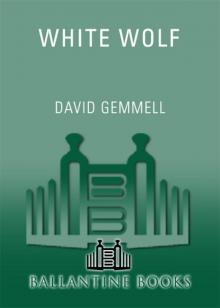 White Wolf
White Wolf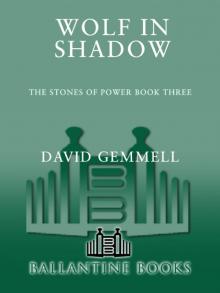 Wolf in Shadow
Wolf in Shadow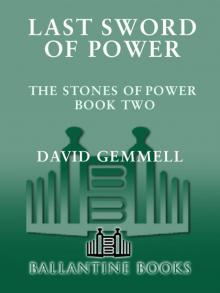 Last Sword of Power
Last Sword of Power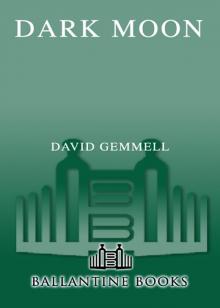 Dark Moon
Dark Moon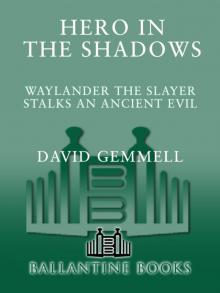 Hero in the Shadows
Hero in the Shadows Gemmell, David - Drenai 09 - Hero In The Shadows
Gemmell, David - Drenai 09 - Hero In The Shadows Waylander
Waylander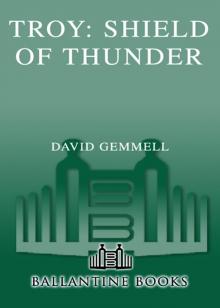 Shield of Thunder
Shield of Thunder Stormrider Stormrider
Stormrider Stormrider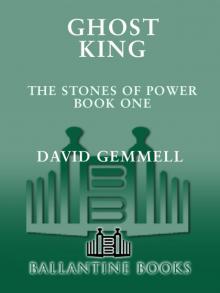 Ghost King
Ghost King Legend
Legend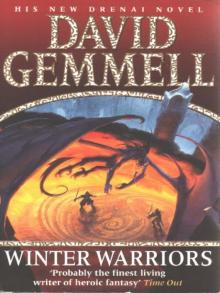 Winter Warriors
Winter Warriors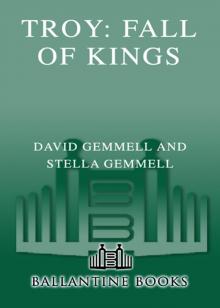 Fall of Kings
Fall of Kings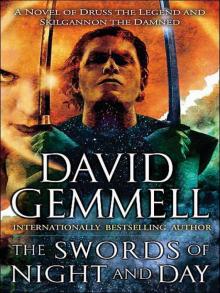 The Swords of Night and Day
The Swords of Night and Day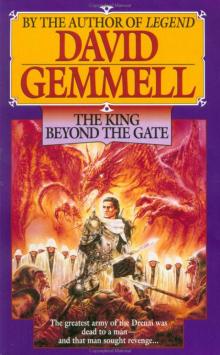 The King Beyond the Gate
The King Beyond the Gate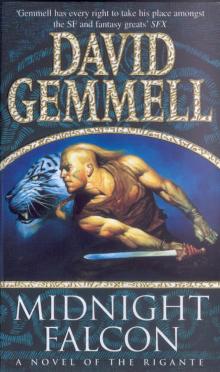 Midnight Falcon
Midnight Falcon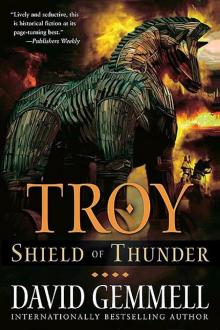 02 - Shield of Thunder
02 - Shield of Thunder In the Realm of the Wolf
In the Realm of the Wolf Ravenheart
Ravenheart The First Chronicles of Druss the Legend
The First Chronicles of Druss the Legend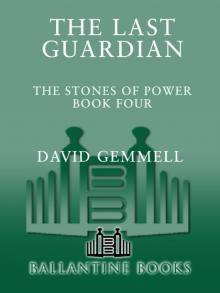 Last Guardian
Last Guardian Stormrider
Stormrider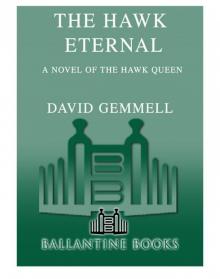 The Hawk Eternal
The Hawk Eternal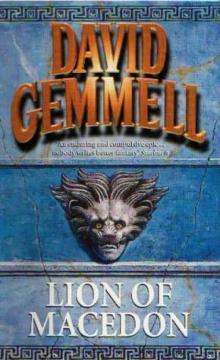 Lion of Macedon
Lion of Macedon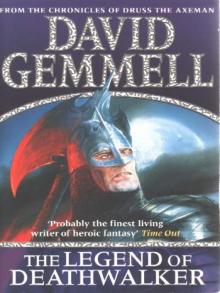 The Legend of Deathwalker
The Legend of Deathwalker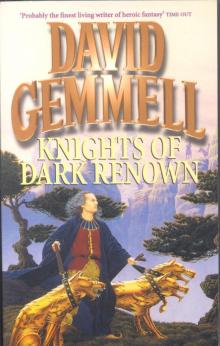 Knights of Dark Renown
Knights of Dark Renown Echoes of the Great Song
Echoes of the Great Song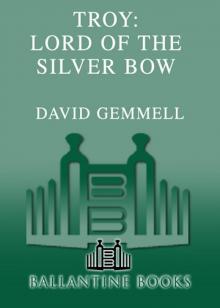 Lord of the Silver Bow
Lord of the Silver Bow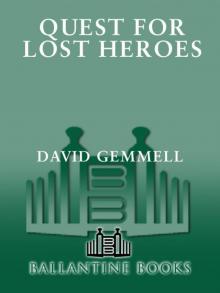 Quest for Lost Heroes
Quest for Lost Heroes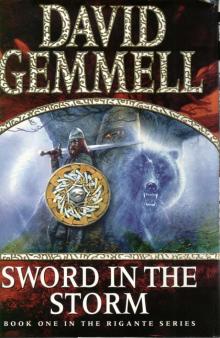 Sword in the Storm
Sword in the Storm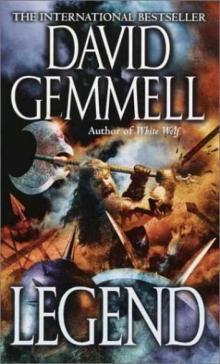 Drenai Saga 01 - Legend
Drenai Saga 01 - Legend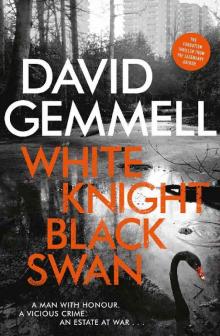 White Knight/Black Swan
White Knight/Black Swan![[Troy 02] - Shield of Thunder Read online](http://i1.bookreadfree.com/i/03/19/troy_02_-_shield_of_thunder_preview.jpg) [Troy 02] - Shield of Thunder
[Troy 02] - Shield of Thunder Lord of the Silver Bow t-1
Lord of the Silver Bow t-1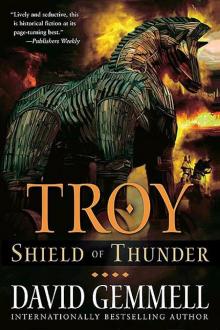 Shield of Thunder t-2
Shield of Thunder t-2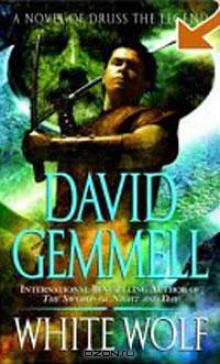 White Wolf: A Novel of Druss the Legend dt-10
White Wolf: A Novel of Druss the Legend dt-10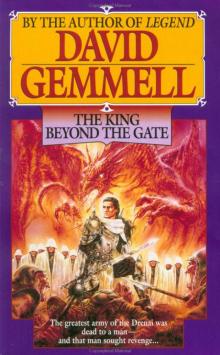 Drenai Saga 02 - The King Beyond the Gate
Drenai Saga 02 - The King Beyond the Gate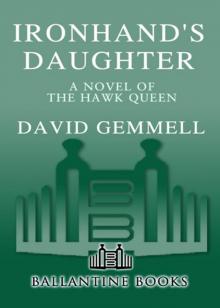 Ironhand's Daughter
Ironhand's Daughter Gemmell, David - Drenai 06 - The First Chronicles of Druss the Legend
Gemmell, David - Drenai 06 - The First Chronicles of Druss the Legend The Last Guardian
The Last Guardian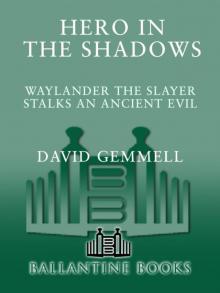 Hero in the Shadows: A Waylander the Slayer Novel
Hero in the Shadows: A Waylander the Slayer Novel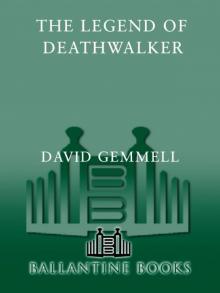 The Legend of the Deathwalker
The Legend of the Deathwalker